News
Donald Trump will be forced to face justice before he takes office

Judge Juan Merchan is the one man making sure no man is above the law
Last Friday, New York Judge Juan Merchan, who presided over Donald Trump’s hush money trial, refused to quash the indictment and set aside the jury verdict which made the president-elect a convicted felon. He announced he would sentence Trump on January 10 and, on Monday the judge denied Trump’s motion for a stay.
Along the way, he delivered a stern rebuke to our soon-to-be president and an important reminder to the rest of us that in a free country, even the most powerful people cannot erase their past. Merchan’s ruling, as the New York Times reported, denies the president-elect “the opportunity to clear his record before returning to the White House.”
“To dismiss the indictment and set aside the jury verdict,” Merchan wrote, “would not serve the concerns set forth by the Supreme Court in its handful of cases addressing presidential immunity nor would it serve the rule of law.”
Merchan has set an example of resistance on the cusp of a second Trump presidency. His ruling will serve this country well as we enter a period in which the occupant of the Oval Office intends to bend judges and others to his will and in which serving him will be the standard against which government officials, journalists, and others will be judged.
Judge Merchan did us all a service by delivering that lesson.
Trump got the message, but he did not like it. He lashed out at the legal proceedings that resulted in his conviction and
Trump got the message, but he did not like it. He lashed out at the legal proceedings that resulted in his conviction and at Merchan.
“Every major legal pundit… has stated strongly there was no case, there is no case, and this was just a witch hunt,” Trump claimed to Fox Digital News.
Then, getting personal, he turned his fire on Merchan. “The judge,” Trump claimed, without any evidence, “is the most conflicted judge in the history of jurisprudence…. He created a case out of nothing because he wanted my political opponent to win.”
And, not surprisingly, the president claimed that “Nobody “has ever gone through what I go through—this is a disgrace.”
No, Merchan’s ruling is the very opposite of a disgrace. What Merchan said, and the fact that he set the sentencing date mere days before Trump’s return to power, will remind everyone of the disgrace that he will bring with him to the White House.
Before looking more closely at Merchan’s decision, let me say more about the role of history and memory in a democracy.
Writing in 2019, Jeffries Martin observed that in a democracy, respecting and learning from the past is a singular virtue. “Historical work,” Martin explained, has “long served as a major intellectual bulwark for democratic republics….” He conceded that such work would not in itself “preserve our democracy. But when fostered in a critical and democratic spirit, they constitute an important piece of what we might call a culture of resistance and liberty.”
In a democracy, we can argue over what history means or what parts of the past should be venerated and which should not be, as fights over monuments have shown. But, no one gets to re-write history or erase memory to suit their convenience or serve their partisan purposes. In authoritarian or totalitarian regimes, history and memory belong to the powerful. Rewriting and whitewashing the past, whether of a nation or its leaders, is standard operating procedure. As Jason Stanley puts it, “Authoritarians…erase history… seeking to separate us from our own history to destroy our self-understanding and leave us unmoored, resentful, and confused.”
In a free society, history and memory are treasures. They remind us of who we are by reminding us of what we have done. This is as true for the stories of individuals as it is for social and political histories.
In a free country, history speaks freely. Its judgments can be generous or harsh, but they are meant to be heard. That is true whether those judged are poor or powerful, heroic or infamous.
And that makes facing his and America’s past so painful and problematic for the man who will be this country’s forty-seventh president. As the New Yorker’s Susan Glaser explains, “Rewriting history—and, at times, even outright inverting it—is one of the signatures of Trumpism….”
And he has allies in that effort. Glaser notes that one of House Speaker Mike Johnson’s early acts was to try “to rewrite history to suit Trump’s version of events—a project that will be crucial in determining whether Trump can overcome the stigma of a criminal conviction.”
Johnson’s House Republican majority went so far as to “decree the fact of Trump’s trial off-limits. In one instance, they had a reference to “Trump’s various criminal cases… ‘taken down’—that is, struck from the official record.”
Erasing his past is what Trump and his lawyers asked Merchan to do. But that is precisely what Merchan refused to do.
On virtually every page of Merchan’s 18-page opinion, the judge shows a reverence for the past, whether it be the past recorded in relevant judicial opinions or Trump’s New York criminal trial. On the third page, he reiterates the central truth about Trump’s past, which he will not obliterate.
He says in, straightforward and simple prose, that“the Defendant has been found guilty on 34 felony counts…by a unanimous jury of Defendant’s peers, after trial.” Merchan insists that the significance of that “cannot possibly be overstated.”
He rightly calls respecting that verdict a “bedrock principle in our Nation’s jurisprudence.”
In evaluating Trump’s claim that the Supreme Court’s presidential immunity decision requires that the verdict be set aside, Merchan carefully parsed applicable precedent. He showed us that in a court of law, judges are not free to ignore precedents with which they disagree or to make the past disappear.
That is why Merchan could conclude that dismissing the indictment and setting aside the jury verdict “would not serve the concerns set forth by the Supreme Court in its handful of cases addressing Presidential immunity nor would it serve the Rule of Law.”
Before ending, Merchan showed his fidelity to the past that Trump wanted him to erase by reiterating that “A jury heard evidence for nearly seven weeks and pronounced its verdict…”
That fidelity is why, as Merchan notes, Trump has great “disdain for the Third Branch of government” and takes every opportunity, as he did on the Fox Digital Network, “to broadcast… his lack of respect for judges, juries, grand juries and the justice system as a whole.”
And the judge did one other thing that produced Trump’s rage. He insisted on setting “this matter down for the imposition of sentence prior to January 20, 2025.”
To be clear, Marchan has already stated that he does not intend to imprison the president-elect. Still, Marchan’s move means that before Trump again swears to preserve, protect, and defend the Constitution, he will learn that under its terms, he has no power to erase the past and escape its judgment. Judge Merchan did us all a service by delivering that lesson.
News
“I think yes”: Biden believes he would have won election over Trump had he stayed in the race

When asked if his health would have held up to four more years of the presidency, Biden said “Who the hell knows?”
President Joe Biden thinks he had the juice.
The outgoing president speculated that he would have beaten President-elect Donald Trump a second time had he stayed in the presidential race in 2024. In a wide-ranging interview with USA Today, Biden was adamant that he would have fared better than Vice President Kamala Harris but balked on whether he could have served for four more years.
“It’s presumptuous to say that, but I think yes,” Biden told the outlet when asked if he would have won in November. “When Trump was running again for reelection, I really thought I had the best chance of beating him.”
Biden was less confident about making it through a second term. He said he considered “pass[ing] the baton” because he “wasn’t looking to be president when I was 85 years old, 86 years old.”
“Who the hell knows?” Biden said when questioned directly about whether he would have held his hypothetical presidency through 2028.
Elsewhere in the interview, Biden speculated about how his presidency would be remembered and advocated for what he viewed as the strengths of his administration.
“I hope that history says that I came in and I had a plan how to restore the economy and reestablish America’s leadership in the world,” Biden said. “That was my hope. I mean, you know, who knows? And I hope it records that I did it with honesty and integrity, that I said what was on my mind.”
News
BREAKING: Mexican President Claudia Sheinbaum Claps Back After Trump Suggests Renaming Gulf of Mexico to “Gulf of America” with Bold Renaming Proposal of Her Own!
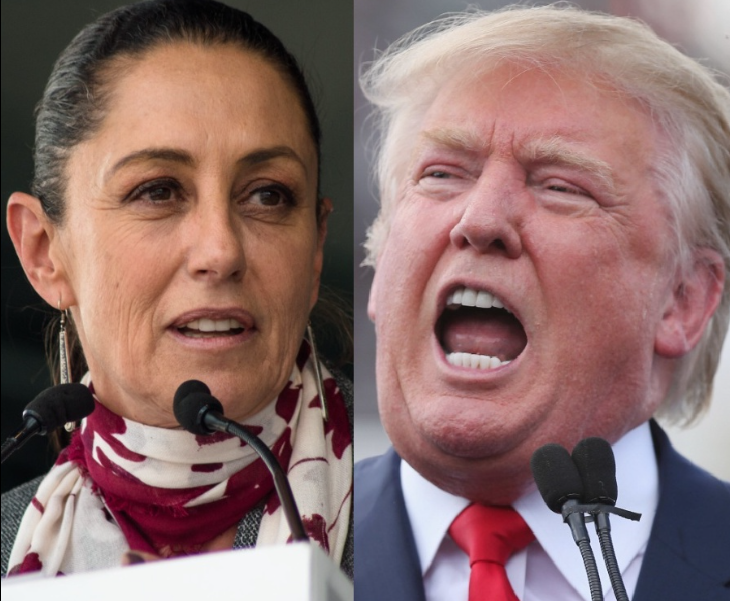
Mexican President Claudia Sheinbaum hits back hard after Donald Trump absurdly suggests renaming the Gulf of Mexico to the “Gulf of America” by suggesting some renaming of her own.
This is how you handle a man-child like Trump…
“I mean obviously, ‘Gulf of Mexico,’ the name is recognized by the United Nations, an organism of the United Nations. But next, why don’t we call it ‘Mexican America?’ It sounds nice, doesn’t it?” Sheinbaum said at a press conference.
She then waved at a map showing that North America was historically referred to as “Mexican America” before the rise of the United States.
“Since 1607 The Constitution of Apatzingán was for Mexican America, so we’re going to call it ‘Mexican America,’ it sounds nice, doesn’t it?” she went on. “And Gulf of Mexico, well, since 1607 and it’s also recognized internationally.”
Brian Winter, vice president of the Council of the Americas, praised Sheinbaum’s remarks—
“Humor can be a good tactic, it projects strength, which is what Trump responds to. It was probably the right choice on this issue,” he said.
“Although President Sheinbaum knows it won’t work on everything — Trump and his administration will demand serious engagement from Mexico on the big issues of immigration, drugs and trade,” Winter added.
Incidents like this reaffirm what a huge mistake the United States made be reelecting Trump. We are transitioning from stable, sane governance to the egomaniacal ravings of a reality TV star.
The world is laughing at us.
News
Trump’s trolling and tariffs sped up Trudeau’s demise. How will Canada handle him now?

Liberal Party infighting over Trudeau’s handling of the president-elect and his threat of tariffs dealt a final blow to the prime minister’s premiership. What now?
Canadians woke up Tuesday to an uncertain future, after Prime Minister Justin Trudeau said he would resign and bring his near-decade in power to an end.
Trudeau’s announcement came just days into an election year and followed weeks of mounting pressure from within his own party to step down as he battled dire poll ratings partly driven by soaring inflation, rising immigration and his handling of President-elect Donald Trump.
“If I’m having to fight internal battles, I cannot be the best option” in Canada’s next election, Trudeau, 53, told reporters in Ottawa.
His decision has triggered an urgent search within the Liberal Party to identify a new candidate who can take on Conservative leader Pierre Poilievre. Poilievre has dominated in the polls and was last on 44% according to the Canadian Broadcasting Corporation, compared with Trudeau — whose rating sits just above 20%.
The Trump factor
A key focus for whoever leads Canada next will be managing their country’s relationship with the incoming Trump administration.
After winning re-election in November, the president-elect vowed to impose a 25% tariff on all products imported from Canada and Mexico.
While Trudeau sought to appease Trump, visiting him at his Mar-a-Lago estate in Florida, the incoming president has since repeatedly jabbed at the prime minister, suggesting making Canada the 51st state and reiterating the idea in response to Trudeau’s resignation.
Trudeau’s handling of Trump precipitated the final blow to his tenure, with the high-profile departure last month of his Deputy Prime Minister and Finance Minister Chrystia Freeland. In a scathing resignation letter, she accused Trudeau of failing to take seriously Trump’s threats to increase import tariffs on Canadian goods.
Freeland warned that Canada needed to take Trump’s plans “extremely seriously” and avoid “costly political gimmicks.”
In contrast to Trudeau, Poilievre — the former-Conservative minister’s biography touts him as a “life-long conservative” and “champion of a free market” — has sought to present himself as the candidate with the “strength and smarts to stand up for this country.”
In an interview with Canadian broadcaster CTV News last month, Poilievre said that his first message for the incoming president was “that first and foremost, Canada will never be the 51st state of the U.S.” — and Canada, he said, had a “very proud future ahead of us.”
Tari Ajadi, a politics professor at McGill University in Montreal, was less sure. He told NBC News that Poilievre has yet to produce a clear plan on how to tackle the Canada-U.S. relationship under Trump, adding that “I think Canada’s in for a rough ride.”
What happens now?
Even though Trudeau is quitting, Canadians will have to wait for months before they can head to the polls.
An election date has yet to be announced, and while the Canada Elections Act says it must be held on or before Oct. 20, Trudeau’s resignation means it’s likely that a vote will be called before then.
Before that can happen, the Liberal Party must find a candidate. Trudeau said he would remain at the party’s helm until his party colleagues have undertaken a “robust, nationwide, competitive process” to find his successor.
In the meantime, Trudeau said Canada’s governor general had accepted his request to prorogue Parliament, suspending proceedings without the dissolution of parliament, until March 24. Then, a confidence vote is expected to be held, with a no-confidence result triggering the next federal election.
That means the Liberal government will remain in power, but parliamentary activity will come to a halt.
Referring to his party’s lack of working majority and Canada’s legislative gridlock, Trudeau said Monday that “Parliament has been paralyzed for months after what has been the longest session of a minority Parliament in Canadian history.”
Who will replace Trudeau?
Trudeau, a former teacher who campaigned with the slogan “sunny ways,” took office in November 2015 and enjoyed high popularity ratings early in his leadership with the promise of liberal reforms, progressive tax policies and a focus on gender equality.
His initial appeal was also boosted by the legacy of his father, the charismatic but polarizing Pierre Trudeau, who was one of Canada’s longest-serving leaders.
But in recent years, Trudeau’s approval ratings plummeted from around 65% in September 2016 to around 22% in December, according to the nonprofit Angus Reid Institute.
According to figures from the Angus Reid Institute, Freeland, a former journalist, is the Liberal candidate most likely to beat Poilievre.
Former Bank of Canada governor Mark Carney is also a contender, and the Conservatives have sensed that. They have long attacked Carney, with Poilievre dismissing him as “just like Justin.”
But regardless of who Trudeau’s successor is, “it’s hard to imagine anyone coming in who can hold on to the government in the next election,” Cornell University government professor Peter Loewen.
-

 News3 weeks ago
News3 weeks agoU.S. Military Service Is the Strongest Predictor of Carrying Out Extremist Violence
-

 Uncategorized3 weeks ago
Uncategorized3 weeks agoBREAKING: Kylie Kelce hits back hard after MAGA trolls swarm her with hatred for daring to dethrone Joe Rogan as the #1 podcaster in America.
-
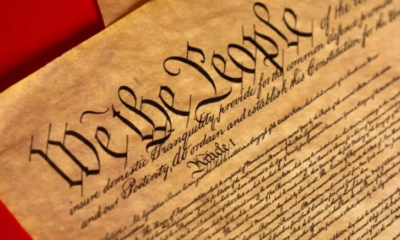
 News2 weeks ago
News2 weeks agoConstitutional Law expert: Trump will be an “illegitimate” President given he’s barred from office by 14th Amendment
-
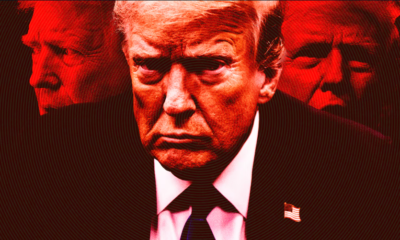
 News2 weeks ago
News2 weeks agoTrump Blames ‘Deranged’ Enemies for Hush Money Case in Posts
-

 News3 weeks ago
News3 weeks agoMerchan: Trump will be sentenced
-
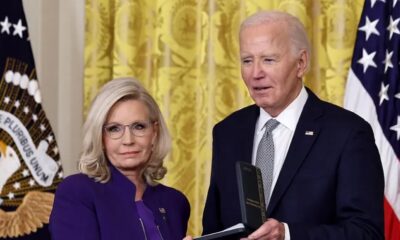
 News3 weeks ago
News3 weeks agoMAGA “offended” at Liz Cheney award
-
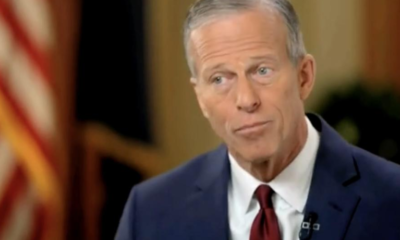
 News2 weeks ago
News2 weeks ago‘Is It Realistic?’: Top Republican Casts Doubt on Trump’s Deportation Quest
-
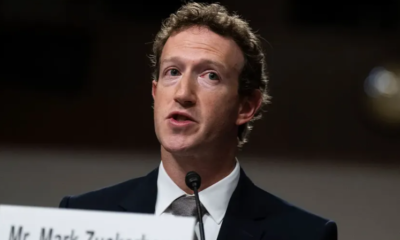
 News2 weeks ago
News2 weeks agoMark Zuckerberg tells Fox News that Meta will “get rid of fact checkers” in latest appeal to Trump






